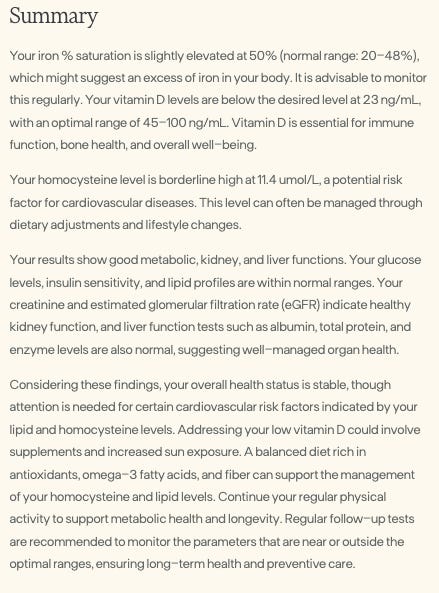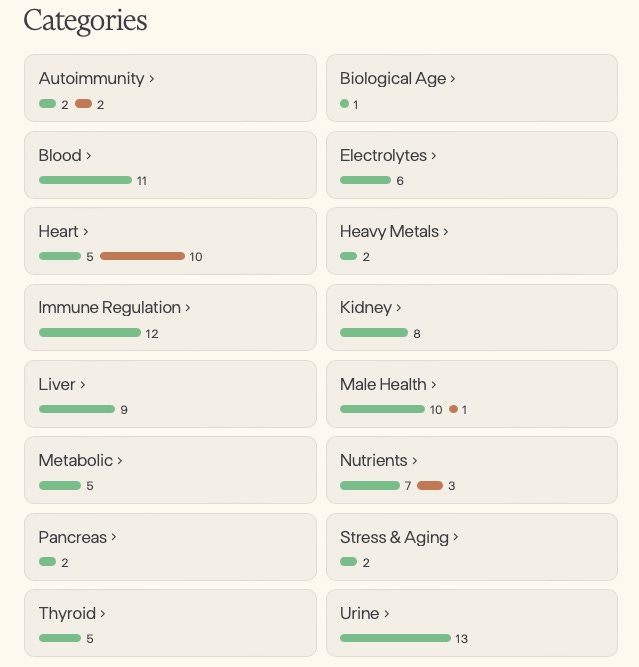Personal Science Week - 240912 Function Health
My experience with Function Health and other blood tests
Few health metrics are as useful as a full blood panel, so naturally personal scientists want to keep up with the latest.
This week I review my experience with the $500 comprehensive blood test from Function Health and describe how it compares to alternatives.
We mentioned Function Health back in PSWeek 240711 after they received a $53M investment from VC firm Andreesen Horowitz hoping to turn them into the biggest company in the world. Their main offering for now is a comprehensive blood test that includes 107 biomarkers from blood and urine. You can also easily purchase “add-ons” like Grail cancer detection ($899), STDs ($49), Celiac ($69) and many more.
Co-founded by popular functional medicine doctor/author Mark Hyman and e-commerce entrepreneur Jonathan Swerdlin, they claim to have already conducted more than 50,000 tests with a waiting list of over 200,000, making them already a formidable healthtech company.
They tout the waiting list like it’s a big deal, but I’m not sure if that’s real or just a way to build excitement. My request to join was granted in a few days without my knowing anyone or doing anything special. After I enrolled paid my $500, they gave me a bunch of “early invites”, which you’re welcome to use for yourself (No, I get no compensation for this).
Their health intake form is pretty standard (“what are your known food allergies?”, “What best describes your diet?”, etc. One of the questions asks me to state my goals, in plain English (I said “energy, longevity, strong immune system”). Unlike, say, InsideTracker, there’s currently no standalone app or a way to pull data from other sources like an Apple Watch or 23andme.
The blood draw takes place with a professional phlebotomist visit, easily scheduled through their website. The large number of tests requires many vials of blood—too many for one sitting—so you have to schedule two appointments, preferably on consecutive days. For me that was a Quest lab a few miles from my house, which I was able to book within a week. And maybe the company really is popular—the woman who took my blood claimed she had had been doing a lot of the same tests.
Results
I received my Function Health reports in two batches. The first came about a week later, followed a couple days later with the remainder. And boy is it comprehensive! Fortunately for readability, the results are divided into categories with “out of range” items highlighted:
I was pleased to see that my biological age is younger by 7.5 years than my chronological age. Function uses your blood —not the actual DNA — to get an approximation of DNA methylation based on Morgan Levine’s “DNAm PhenoAge” (aka Phenotypic Age). Although not the “gold standard”, Levine claims the (much cheaper and easier) blood-based method is almost as good.
The website breaks these results down into very detailed notes about my results. The notes are obviously written by AI, although presumably everything has been “checked” by a real doctor (how thoroughly? who knows?)

That’s just the summary. The report continues with page after page of additional details. And finally, a specific list of suggestions, customized for me:

The company writes “beta” and “alpha” all over the place, I suppose to shield them from the obvious limitations that I’m sure they’re working to improve. For example, the Action Plan doesn’t reference outside sources, so it’s not (yet) possible to dig more deeply if you want to understand the reasoning behind a particular recommendation.
You Can’t Export Your Results
The Function Health web site is fine for people just becoming interested in health, but serious personal scientists will ultimately want to access the data directly, Unfortunately there isn’t currently a true export function. Your results are presented by Health Gorilla, so they don’t even show up in your Quest Diagnostics account, preventing easy integration with Apple Health.
In other words, there’s no way to compare your current results with previous ones from another company.
Thankfully, you can download PDFs of the blood test results, so it is possible to do some of this comparison through external tools (see below). But there is no way to download or print the health summary and food/supplement recommendations (other than using your browser’s clunky print function). In fact, the site deliberately prevents you from text selection that would let you copy/paste to another app.
Why the limitations on export? I assume this is partly because the company is new. It’s possible that one of their lawyers warned them about potential misuse from dumb users accidentally leaking their own data. But come on: the tradeoff is that the rest of us are stuck with whatever limited analysis the company itself provides.
To be more blunt, I think this points to a fundamental philosophical flaw in the company’s approach toward health data. That data belongs to me, not them, and they should from day one make it as easy as possible for me to carry it elsewhere.
How to Convert Your PDF into a Spreadsheet
Fortunately, it was pretty easy for me to turn my Function Health data into the kind of spreadsheet that lets me compare with previous (and future) tests.
Their competitor InsideTracker, which really does understand the needs of personal scientists, has always permitted simple CSV data export. You can also import through InsideTracker’s DIY upload feature. Through their combination of automated and manual tools, they were able to take my Function Health PDFs and add to my InsideTracker account effortlessly. The only downside is that the process takes a few days.
Another solution is with ChatGPT, which immediately read my results and turned it into a useable format on the first try. ChatGPT also lets me easily ask additional questions. (See PSWeek230511 for our previous discussion for how to apply GPT-4 to your personal health issues. Also updated in PSWeek 240222 and more DIY suggestions in PSWeek 230502).
If you’d prefer a app, there are a growing number of apps that provide similar services:
Carrot Care is a free app that lets you organize your blood tests. You'll need to premium version to export to CSV. The app makers claim your results are stored locally, never sent to their servers.
There is also Ornament, a Swiss-based company that claims to have 2M users worldwide and “co-owns” several health-related sites including Selfdecode, Selthhacked, Lab Test Analyzer, Spiden, and Genius lab. One of their competitors claims Ornament includes Russia-based team members, in case that bothers you.
Finally, our favorite at-home blood testing company, SiPhox, now offers its own “bring your own data” service. (See our latest review of SiPhox and other blood testing options in PSWeek 231117). Right now they only support Labcorp, Quest, InsideTracker, LetsGetChecked, and Everlywell reports, and it choked when I tried to give my Function PDF.
tldr;
I’m glad I tried Function, even at the current high price tag. The company is led by an aggressive team that obviously wants to make the best personal health product in the business, so I’m proud to be an early user who can participate as they add more features. They’re probably a good option for somebody who’s just getting started with comprehensive blood testing and wants as big a picture as possible. I learned a few things about my own body’s level of toxins, immune function, and other parameters I wouldn’t have known to test on my own.
But if you’ve already tried InsideTracker (especially their $490 Ultimate), you won’t learn much you didn’t already know. And SiPhox, despite its fewer (about 20) biomarkers, can test multiple times a year for the price of one Function test.
For me, now that I know my own specific biomarkers to watch, I’ll probably just test those using Own Your Labs, which provides wholesale pricing on LabCorp tests (PSWeek 220602). I can still upload my results to InsideTracker and SiPhox, giving me the best of all worlds.
I’ll be walking through more of my blood test results in future posts, so keep reading Personal Science Week for more details.
In the Hopper
Speaking of other tests, here are a few personal science-related diagnostics that people have told me about recently. I haven’t tried them myself (yet) so please let me know if you have any experience.
Mito looks like a head-to-head competitor of Function Health, only with two tests instead of just one. You get 100+ biomarkers and a second mid-year test for $500.
Theriome is a $750 blood-based test that claims to do “deep molecular profiling” based on an at-home blood test. They analyze 126 metabolites across 68% of the metabolic pathways to give a breakdown of your propensity to a bunch of diseases.
A study of more than 1,200 patients with signs of the disease found the Precivity AD2 blood test, which measures ratios of the proteins tau and amyloid-beta, detected the disease more often than doctors did.
Several people have suggested Vibrant Wellness ($1400) as the gold standard for chronic disease testing. Naturopaths often use this for conditions that are hard to diagnose otherwise.
About Personal Science
The word “science” is overused, and can mean everything from wonder at the natural world (Black holes! Dinosaurs!) to cool engineering (space ships! vaccines! iPhones!). Some people spend years collecting fancy degrees so they can get jobs where they are paid to do experiments professionally.
Personal scientists enjoy all of those things of course, but more importantly we think there is a way of living based on principles of open-minded skepticism and rigorous observation. This is a weekly newsletter where we exchange ideas we think are interesting to anyone who wants to use science to understand and solve problems in daily life.
If you have other topics to discuss, let us know.





This is all great info, thank you! And thank you for keeping it real with Function Health re: data ownership. I don't see a lot of added value from another 3rd party company that packages blood tests I could order on my own.
Have you run into Chronomics?